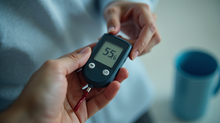10 Ways Diabetes Can Affect Your Oral Health
- Maureen Sullivan
- Nov 20, 2022
- 3 min read
If you are living with diabetes, it's important to be aware of how the condition can affect your oral health. Diabetes can lead to a number of oral health problems, including gum disease, tooth decay, and dry mouth. In this blog post, we will discuss 10 ways diabetes can affect your oral health. We will also provide tips for keeping your teeth and gums healthy if you are living with diabetes.

Gum Disease
People with diabetes are more prone to developing gum disease, which can lead to tooth loss and swelling of the gums. Poor blood sugar control can cause a buildup of plaque and tartar on teeth, which can increase the risk of infection and inflammation. To prevent gum disease, it's important to practice good oral hygiene every day by brushing twice a day (or more) and flossing once per day. Routine dental check-ups are also essential for diagnosing and preventing gum disease in people with diabetes.
Tooth Decay
Uncontrolled diabetes increases the risk of cavities due to high levels of sugar in the saliva. This creates an environment where bacteria can feed on sugars and grow, leading to tooth decay. To prevent tooth decay, it's important to limit your intake of sugary foods and drinks as much as possible. Regular dental check-ups are also essential for diagnosing cavities early and preventing further damage.
Dry Mouth
High blood sugar levels can cause dehydration, leading to dry mouth—a condition in which the salivary glands produce less saliva than normal. The lack of saliva makes it difficult to swallow food or speak properly and increases the risk of tooth decay and gum disease. To help relieve dry mouth, try drinking more water throughout the day and chewing sugar-free gum or sucking on hard candy that is free of sugar and artificial sweeteners.
Soreness or Burning Sensation in Tongue or Gums
High levels of sugar in the saliva can cause a burning sensation in the tongue or gums. This can make it difficult to eat and speak properly. To relieve the pain, try rinsing your mouth with an antibacterial mouthwash or brushing your teeth more often. Eating cold foods like ice cream and popsicles can also help reduce the discomfort.
Infections
People with diabetes are more prone to developing infections such as abscesses due to poor circulation and an impaired immune system. If left untreated, these infections can spread throughout the body and become life-threatening. It's important to visit your dentist regularly for routine check-ups to detect any signs of infection early on.
Bad Breath
Poor blood sugar control can lead to a buildup of bacteria in the mouth, resulting in bad breath. To prevent bad breath, brush your teeth twice a day and floss once per day. Rinsing with an antibacterial mouthwash can also help reduce odor-causing bacteria.
Delay in Healing After Dental Procedures
People with diabetes tend to heal more slowly after dental procedures due to poor blood circulation and an impaired immune system. The delay in healing increases the risk of infection and should be monitored closely by the dentist or doctor throughout the procedure.
Oral Thrush
Poorly controlled diabetes can cause an overgrowth of yeast in the mouth, leading to oral thrush—a condition marked by white patches in the mouth and throat. Oral thrush can be uncomfortable and it's important to treat the condition promptly with antifungal medication prescribed by your doctor or local dentist.
Tooth Sensitivity
High levels of sugar in the saliva can cause teeth to become sensitive, making it painful to eat hot or cold foods. To reduce sensitivity, use a toothpaste specifically designed for sensitive teeth and avoid acidic or sugary foods and drinks as much as possible.
White Spots on Teeth
High blood sugar levels can lead to an accumulation of plaque on teeth, resulting in white spots—a sign of early tooth decay. It's important to visit your dentist regularly for routine check-ups so any signs of tooth decay can be detected and treated promptly.
Although diabetes can affect your oral health in a number of ways, following proper oral hygiene habits—including brushing twice a day, flossing once per day, and visiting the dentist regularly—can help prevent many of these complications. It's also important to keep blood sugar levels under control to reduce the risk of tooth decay, gum disease, and other oral health problems associated with diabetes. By taking good care of yourself and paying close attention to any changes in your mouth, you can maintain healthy teeth and gums for years to come!



































header.all-comments